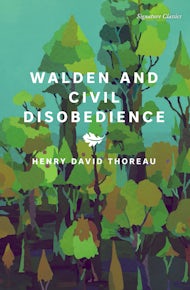Walden and Civil Disobedience
By Henry David Thoreau (Author)
Price$20.00
Format Hardcover
BUY NOW >
X
Walden and Civil Disobedience
by Henry David Thoreau
OVERVIEW
Henry David Thoreau reflects on life, politics, and society in these two inspiring masterworks: Walden and “Civil Disobedience.” In 1845, Thoreau moved to a cabin that he built with his own hands along the shores of Walden Pond in Massachusetts. Shedding the trivial ties that he felt bound much of humanity, Thoreau drew both physical and mental inspiration from the land, and he pursued truth in the quiet of nature. In Walden, he explains how separating oneself from the world of men can truly awaken the sleeping self. Thoreau holds fast to the notion that you have not truly existed until you adopt such a lifestyle—and only then can you reenter society, as an enlightened being. These simple but profound musings—as well as “Civil Disobedience,” his protest against the government’s interference with civil liberty—have inspired many to embrace his philosophy of individualism and his love of nature. More than a century and a half later, his message is more timely than ever.
ABOUT THE AUTHOR(S)
Henry David Thoreau (1817–1862) was an American author, naturalist, transcendentalist, tax resister, development critic, philosopher, and abolitionist who is best known for Walden, a reflection upon simple living in natural surroundings, and his essay “Civil Disobedience,” an argument for individual resistance to civil government in moral opposition to an unjust state.




